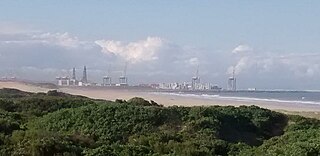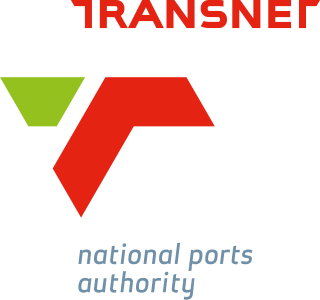Different methods of transportation in South Africa include roads, railways, airports, water, and pipelines for petroleum oil. The majority of people in South Africa use informal minibus taxis as their main mode of transport. BRT has been implemented in some South African cities in an attempt to provide more formalised and safer public transport services. These systems have been widely criticised due to their large capital and operating costs. A "freeway" is different from most countries as certain things are forbidden which include certain motorcycles, no hand signals, and motor tricycles. South Africa has many major ports including Cape Town, Durban, and Port Elizabeth that allow ships and other boats to pass through, some carrying passengers and some carrying petroleum tankers.

Gqeberha, formerly known as Port Elizabeth and colloquially often referred to as P.E., is a major seaport and the most populous city in the Eastern Cape province of South Africa. It is the seat of the Nelson Mandela Bay Metropolitan Municipality, South Africa's second-largest metropolitan district by area size. It is the sixth-most-populous city in South Africa and is the cultural, economic and financial centre of the Eastern Cape.

Transnet SOC Ltd is a large South African rail, port and pipeline company, headquartered in the Carlton Centre in Johannesburg. It was formed as a limited company on 1 April 1990. A majority of the company's stock is owned by the Department of Public Enterprises, or DPE, of the South African government. The company was formed by restructuring into business units the operations of South African Railways and Harbours and other existing operations and products.

Metrorail is an operator of commuter rail services in the major urban areas of South Africa. It is a division of the Passenger Rail Agency of South Africa (PRASA), a state-owned enterprise which is responsible for most passenger rail services in South Africa. The Metrorail system consists of 471 stations, 2,228 kilometres (1,384 mi) of track, and carries an average of 1.7 million passengers per weekday.
Shosholoza Meyl is a division of the Passenger Rail Agency of South Africa (PRASA) that operates long-distance (intercity) passenger rail services. It operates various train routes across South Africa, carrying approximately 4 million passengers annually. Before 2009, Shosholoza Meyl was a division of Spoornet, but it was transferred after the formation of PRASA.

Transnet Freight Rail is a South African rail transport company, formerly known as Spoornet. It was part of the South African Railways and Harbours Administration, a state-controlled organisation that employed hundreds of thousands of people for decades from the first half of the 20th century and was widely referred to by the initials SAR&H. Customer complaints about serious problems with Transnet Freight Rail's service were reported in 2010. Its head office is in Inyanda House in Parktown, Johannesburg.

Concor Holdings (Proprietary) Limited. is a South African construction and mining services company. It is active throughout Southern Africa, involved in mining, civil engineering, building and road projects. Concor returned as an independent brand in late 2016.

The Port of Cape Town is the port of the city of Cape Town, South Africa. It is situated in Table Bay.
International Container Terminal Services, Inc. (ICTSI) is a global port management company headquartered in Manila, Philippines. Established on December 24, 1987, ICTSI is the Philippines' largest multinational and transnational company, having established operations in both developed and emerging market economies in Asia Pacific, the Americas, and Europe, the Middle East and Africa. The company is ranked the eighth largest container terminal operator, according to TEU equity volume.
Transnet Engineering is a rolling stock manufacturer and maintenance company. It was established when the engineering workshops of Transnet were transferred to a separate division as Transwerk. It was rebranded Transnet Rail Engineering, and then again to Transnet Engineering after it began assembling port equipment such as straddle carriers. It operates seven workshops.
Transnet Pipelines, a subsidiary of Transnet, is the principal operator of South Africa's fuel pipeline system. It is responsible for over 3,000 kilometres of pipelines. It is responsible for petroleum storage and pipeline maintenance. Transnet Pipelines works with petrols, diesel fuel, jet fuel, crude oil and natural gas. Total throughput is over 16 billion litres per year.

Protekon performs maintenance and development services for the ports, railways and terminals of South Africa's state-owned transportation giant Transnet. It is similar in function to the company Transnet Engineering, which performs maintenance and development for the rolling stock of Transnet's railways divisions.

The Coega Special Economic Zone (SEZ), established in 1999 and 11,500 ha in extent, is situated near Gqeberha in the Eastern Cape province of South Africa. The initiative is a multibillion-dollar industrial development complex customised for heavy, medium and light industries, and adjacent to a deep-water port, the Port of Ngqura. The Coega Development Corporation (CDC) is the developer and operator of the Coega SEZ and is responsible for the land side infrastructure, while the Transnet National Ports Authority (TNPA) develops the deep-water port facility, the Port of Ngqura.

The Port of Ngqura is a deepwater port on the east coast of South Africa, 20 km northeast of Gqeberha. It was authorised by an act of parliament in 2002, construction started in September 2002 and the port became operational in October 2009 when the MSC Catania docked at the port.

Port Botany is a deepwater seaport located in Botany Bay in Sydney, Australia. The port is dominated by trade in containerised manufactured products and, to a lesser extent, bulk liquid imports including petroleum and natural gas. It is one of Australia's largest container ports and is administered by NSW Ports which entered into a 99-year lease agreement with the Port Authority of New South Wales in May 2013.

The Port of Richards Bay is located in Richards Bay harbour on the Indian Ocean coast of South Africa, and contains the Richards Bay Coal Terminal (RBCT) which is the largest coal export facility in Africa.

Transnet National Ports Authority (TNPA) is a government corporation of South Africa and a subsidiary of Transnet, responsible for managing and governing eight of South Africa's major seaports. TNPA is a landlord authority responsible for the master planning, controlling of port navigations, controlling of port services & facilities and marketing of the port. Another division of Transnet, Transnet Port Terminals (SAPO), is responsible for terminal operations and cargo handling. TNPA's main offices are located at Braamfontein.
The Port of Port Elizabeth is a port in the city of Port Elizabeth, in the Eastern Cape, South Africa. Located in Algoa Bay, it handles dry bulk, bulk liquid, breakbulk and containers, as well as providing facilities for tugs and fishing vessels.

On 22 July 2021, Transnet became a victim of a ransomware attack. The attack caused Transnet to declare force majeure at several key container terminals, including Port of Durban, Ngqura, Port Elizabeth and Cape Town. The attack was the first time that the "operational integrity of the country's critical maritime infrastructure has suffered a severe disruption" leading the Institute for Security Studies (ISS) to call its impact "unprecedented" in South African history.













